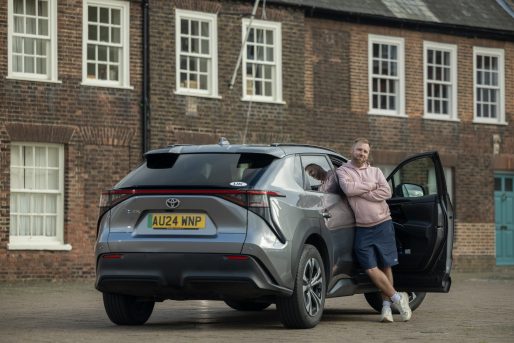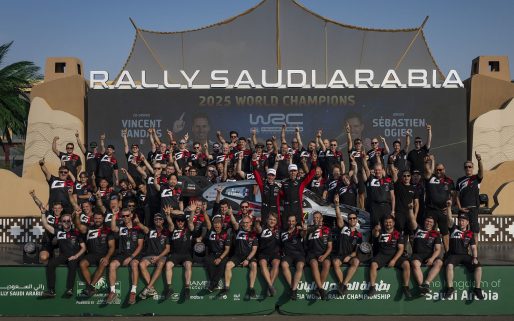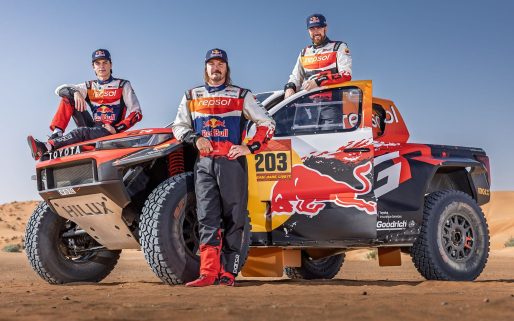It seems that time – and divers – have a tendency to fly. Earlier this year we spent a few days with diver Andrea Spendolini-Sirieix in order to film her instalment of a short docuseries, which gave us a valuable insight into her life and training. Now almost a year has passed, and the 20-year-old, high-flying, high-diving athlete is back home, well-rested and has an Olympic medal to her name.
More events are on their way for this talented Team GB amathlete, not least of which is the Los Angeles 2028 Olympic Games, which means Andrea is beginning to plan her next steps. Staff at Toyota GB’s Eco-HQ were therefore delighted to hear that part of those plans involved touching base with us for an informal, in-person catch-up.
The following is an edited transcript of her interview and audience Q&A session.
Although it’s been a busy couple of years for you, what are your reflections on your experience in Paris 2024?
Andrea Spendolini-Sirieix: “It was incredible and I keep looking back at photos of the event. I felt safe thanks to the excellent security measures, and perhaps because of that it also felt quiet and peaceful. The volunteers were incredible, and the event was so well-organised. It was amazing to see familiar faces in the crowd who had come to support me, even though they don’t really know me personally. I felt very loved and very welcomed.”

What a showcase for sport that was. But what was your most memorable moment?
A: “Being able to hug my family in-person rather than just seeing them through a screen was special. Also, we were blessed with really amazing weather, and I fondly remember the sunsets, the colours and human interactions as I walked around the Olympic village. And the day before we left my coach and I shared a very emotional moment. I was just grateful every day.”
How did you cope with both your highest and lowest points being broadcast on media?
A: “I’ve never felt so much pressure in a competition, especially when questions were flying around the day before about which medal I’d get. The level of public expectation just hit me. But then I compared how I felt in Tokyo with how I felt in Paris and tried to concentrate on just being grateful that I was even there. It’s funny, it felt like the country wanted the medal more than I did! So to release the pressure I just tried to forget about the medal and do my best.
“At the end there was a very emotional interview. I knew I hadn’t competed as well as I could have but I wasn’t sad; I was genuinely very happy. I think my emotions were really a mixture of relief and tiredness. And I was grateful that the interview helped people understand some of the emotions and realities behind competing.”

Have to say, we were all immensely proud of what you accomplished. What was it like, though, to compete for your nation?
Andrea Spendolini-Sirieix: “When we receive the kit I always feel a lot of pride for what it represents. My mum’s Italian and my dad’s French, and I compete for Great Britain — the place that I come from, the place where I was born and call home. But that isn’t just who I am. There’s a lot more that goes into it. My parents have sacrificed so much for me, so when I get medals I like to share them. What matters is the journey and the title and the life that I have.”
What other responsibilities come with being a Team GB athlete, because it’s not just about the event, is it?
A: “I think you have a responsibility as a role model — to speak and act in a way that is kind and inspiring to others. You represent more than just your country; you also represent a sporting federation, your family, your friends… so you cannot just think about yourself. You always have to display characteristics that you wish other people would display. It makes you mature very quickly!”

How long does it take to get back into that four-year cycle of training and preparation after an event like the Olympics?
Andrea Spendolini-Sirieix: “Personally, after Paris concluded I took some time for myself and went on holiday with friends and family in the sun. Then when we came back I took another fortnight off. Those were the best two weeks of my life!
“Having that break helped me mentally detach and actually rest. It was the small things, like having an opportunity to clean and de-clutter my room, to organise myself… I never normally have the time to do that. It enabled me to create space to actually ask myself what I wanted from the next four years. Athletes sometimes feel guilty about resting because they think they’re being lazy, so I wanted to take time off while still being busy.”

How will being at university affect your training?
A: “I love routine. Without it I feel lost, so I’ve worked out a schedule that allows me to learn, train and rest. I like thinking about the future, not necessarily to create a plan, but to make sure I’m not limiting myself to just being a diver. I really value education; it’s something my parents were very sure to instil in me. My coach is also patient in allowing me to create a balanced routine that I’m happy with. One that’s also flexible enough to do things like this!”
What do the next one or two years look like for you in terms of competitions?
A: “I like to take things a year at a time. So for example, the next most important thing is the World Championship in August, and that’s in Singapore. What’s good for me is that I finish university in April/May, so I have a big chunk of time after that to concentrate on training. My priority, though, is not so much training but balance — to enjoy all sides of my life. It’s about taking things step by step and progressing slowly so that I don’t feel overwhelmed and stressed. I’m really enjoying this new approach to life.”

At what point will your Olympic training switch over into LA 2028 mode?
Andrea Spendolini-Sirieix: “It’s usually two years before, because if you were to start now you’d be burnt-out by the time you get there. The reason why I take things year by year is because you need to take things like injuries and physio into account — to either prevent injuries or rest to overcome them. Two years is enough time to grow in experience and then perfect your consistency so you have a better understanding of how well you are going to perform. During a competition you don’t actually want to think that much, because every venue is different. If you don’t have that base level consistency you’re never rooted; you’ll always be changing.”
We’re fascinated by synchronised diving and were wondering how you get matched with somebody else. How does that work?
A: “Lois Toulson and I actually started as an experiment. We were the only two platform divers in competition and they just thought they’d try us together. And then we ended up as European champions in our first competition! Synchro is like any partnership in that it takes a lot of work and humility. Because from a technical side you might have to change things you do that might not work for your partner, and vice versa. You don’t just get scored on your execution of the dive but on how synchronised you are as a pair, and that takes a lot of effort and planning to achieve. So for instance, if your arm swing is a little bit late then your shoulders won’t be in the right position and then it will change the timing of when you go over the edge. It’s all about timing.”
Are there any other challenges you would like to try at some later point in your career?
A: “I’m really keen to get better at photography because I can use it for my degree and for diving. It’s something that I personally love and was one of the things I worked on in my year out from education. Although I can’t do it all the time because there’s not enough room in my bag! Other than that, resting can be seen as a challenge because I probably don’t do it enough.”
Questions from audience:
How did you get into diving, and how long did it take you to pluck up the courage to jump off the high platform?
Andrea Spendolini-Sirieix: “I was very energetic as a child, so my parents threw me into every sport imaginable. I did tennis, gymnastics, break dancing and swimming… but it turned out that diving was the best hybrid of the two things I liked the most, gymnastics and swimming.
“There was also a talent scout that visited when I was in year three of primary school and by the time I was nine or ten I was pretty much focused on diving. I started reluctantly on one session a week and over the years it slowly built up to seven days a week. Now I dive for the love of it. And as for that ten-metre platform, the first time I went up there it was terrifying. It took me 20 minutes to jump off. I was very small and light and it felt like I was flying forever. But the more I did it, the more fun it became.”
What are your thought processes before diving off the platform?
A: “In competition, my only thought is to just go ahead and jump off. I will have trained so much that in the span of a month before the competition I’ll have done the same dive a hundred times. So I know what to do but I also don’t know how it’s going to end up, which is why I just encourage myself to get on with it. As I’m climbing the ladder there’s so much going on inside my head that the only thing which calms me down is prayer. And then when I’m on the platform I try not to think too technically, because then I’ll over-think it all.
“When it comes to the next Olympics in LA, I think the diving is outdoors. Which adds another level of difficulty because you have to account for the time of day, where the sun is, how windy it is etc. When I was competing in Rome we were outdoors and when it came to my dive the sun was right in my face and I couldn’t see anything. It was a guessing game.”
How do you handle negative thoughts?
Andrea Spendolini-Sirieix: “During competitions, I don’t like to be by myself. When you’re alone it’s easy to be consumed by those thoughts. So I sit with my coach and he knows me well enough to identify when I’m starting to over-think things. He cracks jokes or makes me talk about totally unrelated subjects, such as my favourite foods. He’s very good at getting me out of a negative mindset. Surrounding yourself with people that encourage you is a really good plan. Isolating yourself hurts you even more.”
Are you ever able to go diving for ‘fun’ rather than with training in mind?
A: “That’s what this year ahead is all about — training in order to enjoy diving. Even when I’m under pressure, I do enjoy diving. Pre-season training is always the most difficult because you feel the most sluggish and it takes the most discipline to come in. The most fun comes just before the competition when you’re in the full training routine and you feel that you’re at your best.”
Do you have any rituals on the day of competition?
A: “It all depends on the competition and what time of day my event is. If the schedule is kind and the event is later in the morning then I like to take extra time getting myself ready and stay calm. But whatever time it is I like to try and treat it like a normal day; I try not to change anything so that I can stay as calm as possible.”
Is there anybody within Team GB that inspires you? And if so, why?
A: “I wouldn’t say that I have any idols. When you’re inspired by someone it’s hard not to compare yourself with them, and that’s not necessarily helpful. I just try to be understanding of how difficult it can be to train to this level. I think about Tom Daley and how long he’s been in the sport and how he’s so kind. I remember how he’d include me in things when I was really young; I never felt left out when I was around him. But I would say that I’m inspired by all the athletes because of what they do and how amazing they are, even if I don’t know them personally.”
Does it hurt when you hit the water from a tall dive?
A: “It all depends on the angle that you hit the water. If you hit it totally wrong you can really injure or wind yourself, but it can still hurt a bit even if you get it right. For example, my wrists can get quite sore, especially if I’m really tight in my forearms, because my hands are the first things to break the surface. It’s entirely possible to break either your wrists or ankles depending on the way you enter the water. So it’s right that diving is classed as an extreme sport.”
Please continue to take care, then! We’re so delighted that you’ve been able to join us, Andrea. It’s been a fascinating insight into your world and we wish you all the best for your ongoing training and forthcoming events.




